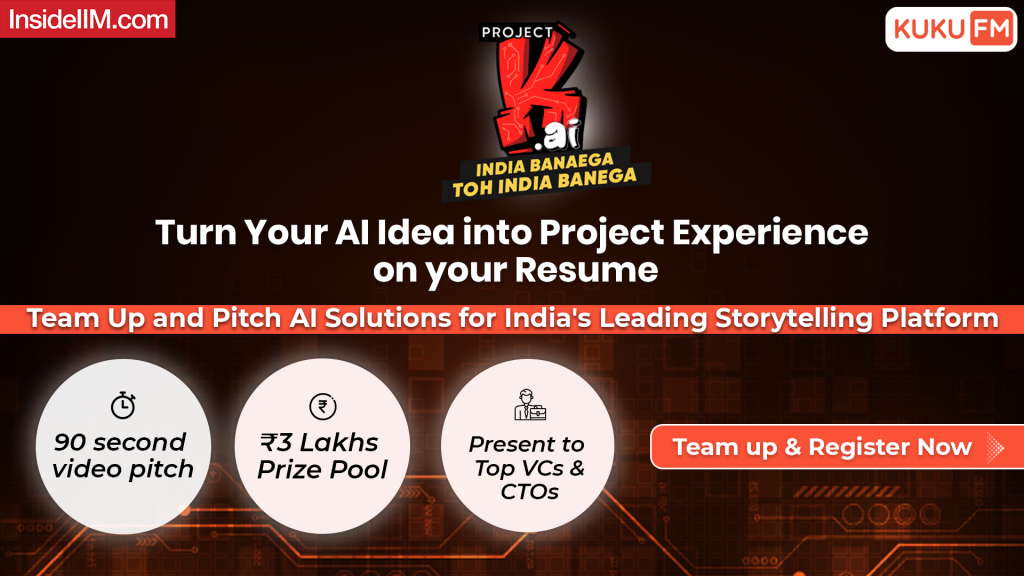For the second half of our conversation with InsideIIM's Best 30 - The Most Employable Graduates of The Class of 2019-21, we spoke to
1. Anish Agarwal (SIBM Pune, Interned at Pidilite Industries - Sales & Marketing domain),
2. Sagar Sahni (XLRI Jamshedpur, Interned at Amazon and secured a PPO),
3. Bhavya Poddar (SPJIMR, Interned at P&G and got a PPO),
4. Ravi Singh (IIM Lucknow, Interned at AT Kearney and bagged a PPO).
1. How do you answer the questions like "Biggest challenges you faced" or "Where you failed to achieve your objectives"?  Ravi:
Ravi: I think the key is being honest here because the interviewers have 8-10 years of experience and they'll know when you bluff your answer.
Anish: I think the main motivation behind why they ask such questions is that they want to see how well you can handle failures. Even later in life, there will be situations where you'll fail, so they want to understand from your past experiences how you've handled such ambiguous situations. It's not necessary that you have to mention something huge.
 Sagar:
Sagar: I believe that drawing a mind map about yourself and your particular experiences before going into an interview helps you to recall what has happened with you. Being honest and laying all your cards on the table is a good strategy because accepting your failures is a strength in itself.
Bhavya: I agree with my panellists and this question was in fact asked to me in my P&G interview. I think what worked for me apart from being honest is that at the end of the answer, I mentioned what my key learning from my failures and how I inculcated it in other situations in my life. It intrigued them.
2. Let's start unravelling your personal journeys.
Bhavya, during your Undergraduate course, you participated in BAHA Essay India for three consecutive years. You led a team of 25 girls from your college and yours was the only all-girls team to be selected in the Top 400 and you secure 32nd rank. So, how was your experience and what were your major learnings?
Bhavya: It was pretty challenging because apart from the technicalities, Vehicle-driving and vehicle-dynamics are considered to be a male-dominated field and not a lot of girls are interested in it. Even if they are, parents and faculties often discourage girls to work in such a field. The key here was to find people who were as driven and had the same mindset. I had a lot of responsibility being the team leader and I had to to keep the team on the same platform at all times. But ultimately, our motivation showed up in our performance. In spite of the challenges we faced, we gave our full efforts.
Anish, you opened up a cafe that allowed customers to pay whatever they wanted. Please tell us what was the ideology behind this initiative and the key takeaways from it?
Anish: This is a concept called "gifting economics" and a lot of theories say that the relationships in businesses are getting transactional day-by-day. There is a need to have a deep, emotional layer towards it. The motivation behind this initiative was to understand how people would react if they were not treated as customers but as guests.
In our cafe, we handed over an envelope to our customers and asked them to pay whatever they wanted to. If they liked our service, they could pay, otherwise, they were not obligated. It was surprising to people in the beginning. We observed that the better we treated them as guests, the more they paid when they left. Everyone carried the generosity forward by paying and continuing the chain. This experiment opened up a lot of insights into customer behaviour and psychology which helped me in my B-school.
Sagar, you are a techie at heart and you've created an application to manage baggage at the airports that optimized the operations by 35%. So, how are you planning to combine your love for technology and business after MBA?
Sagar: I got the opportunity to get involved with the Product team and that made me driven towards MBA. Even during my SIP, I was determined to join a Technology-driven company so that I can take my learnings from my Undergrad. I'm extremely happy that I could secure a PPO by Amazon.
Ravi, you were a senior R&D engineer at ATON before IIML and now you'll be pursuing a career in Consulting at AT Kearney after your MBA. Which role did you enjoy more?
Ravi: I was too much into automotive, vehicle and design that made me love my R&D role but after 2-2.5 years, I felt my career trajectory was narrowing and I felt like a small valve sitting inside an engine. So I wanted to move to a strategic role where I could diversify my experience, I can leverage my capabilities and move towards operations and building supply chains for automotive companies in the long run. I've enjoyed both sides, but that's where I want to go now.
3. That's great! Let's talk about your Summer Internship Experiences.
Anish: I think the internship experience for everyone in 2019-21 batch was very unique but more so for Sales & Marketing because they have to go on the field and experience the life there. I had two projects - one was the Market Research (without going to the market), where I had to rely heavily on phone calls with Retailers and Sales Officers. There were days when I spent 4-5 hours continuously on these calls. The next part was of Sales where I had to pilot their newly launched App. in this, I had to lead a team of TSIs, get the downloads moving and get the feedback on the app. It was very interesting because it was a combination of Sales, Marketing and Tech.
I think, for interviews, companies look for what experience you've had and what you've learnt from them. Most of the focus will be on the learning part, how you handled ambiguous situations, how you structured the problem down and came up for solutions for it. They also might ask you how you could've done it better. It helps the companies understand how you look back at your work, introspect and analyze your issues and faults. I think if someone covers these two aspects, it'd be more than enough to crack the interviews.
Bhavya: P&G interviews are not technical but rather behavioural. Both the interview rounds I faced were behavioural and situational. Being ready in those situations and the counter questions that the interviewers may ask worked out for me. Coming to the project, I was a part of the Market Planning team and I had to make a model for the Demand forecast for one of their brands - Whisper. It was challenging in the online mode because it was a highly data-intensive project. I had to code the model and I had no prior experience in coding. I had to learn everything from scratch and apply it. Thanks to my super-supportive team who gave me appropriate resources and connected me to the people who could help me, I was able to secure a PPO at P&G.
Ravi: I worked on a Growth Strategy CEO agenda for a leading Automotive OEM. I worked primarily on two levers: Product Planning and International Expansion. The three things I loved about Kearney was the accountability I got - I had to work autonomically, fairly and independently and secondly, the mentorship I got. I worked with really smart people and enjoyed my time. Thirdly, the diversity of the work I got, especially considering the short duration for which I was at the firm. In fact, I also got to work on an Industry thought paper during those two months. Overall, it reinforced my aspirations to be a consultant.
Sagar: At Amazon, I was tasked with designing a programme to boost the category sales, then go through the launch strategy for the same and develop a long-term plan. The thing I liked most was that I was given the entire ownership of the program to be designed - I could contact anyone I wanted, I interacted with 7-8 teams and they guided me. Amazon is very open about how they interview candidates and they're quite aligned to their 14 Leadership Principles and I think that's the key to cracking any Amazon interview.
4. What's the one advice for students to make the most of a virtual internship?
Ravi: One thing that worked for me was to create a one-week plan and share it upfront with the team because it's easy to misalign your two-months journey in an online setup. The second was to take regular feedback from my Engagement Manager. It is really helpful because if things aren't going as they planned, you can change the deliverables if you're missing out on some critical things.
Sagar: Adding to that, ask as many questions as you can because they also know that you don't know much, even if that's the lingo or jargon they use. It shows how curious and interested you are towards the project and the organization.
Bhavya: Even I created a structure of what was to be achieved in the two months duration. At the end of every day, I used to have a list of questions that I used to get clarified from my mentor. Keeping in touch with them is very important. It's new for them as well. They don't have much time to give us, so we should be structured.
Anish: I think that a daily tracker and feedback is important. It kept my mentor in the loop because the mentor has to not only see the end result but also what the intern is doing. One thing I've noticed is that if the mentor is at a senior position, interns hesitate to reach out to them. I'd advise you to keep pestering your mentor whenever you need help.
Thank you to all the panellists for taking out time and having the fruitful conversation with InsideIIM. I'm sure it was useful for all the readers as much as it was for me. I wish "All the Best" to my batchmates for their Summer Internship Interviews. :)




